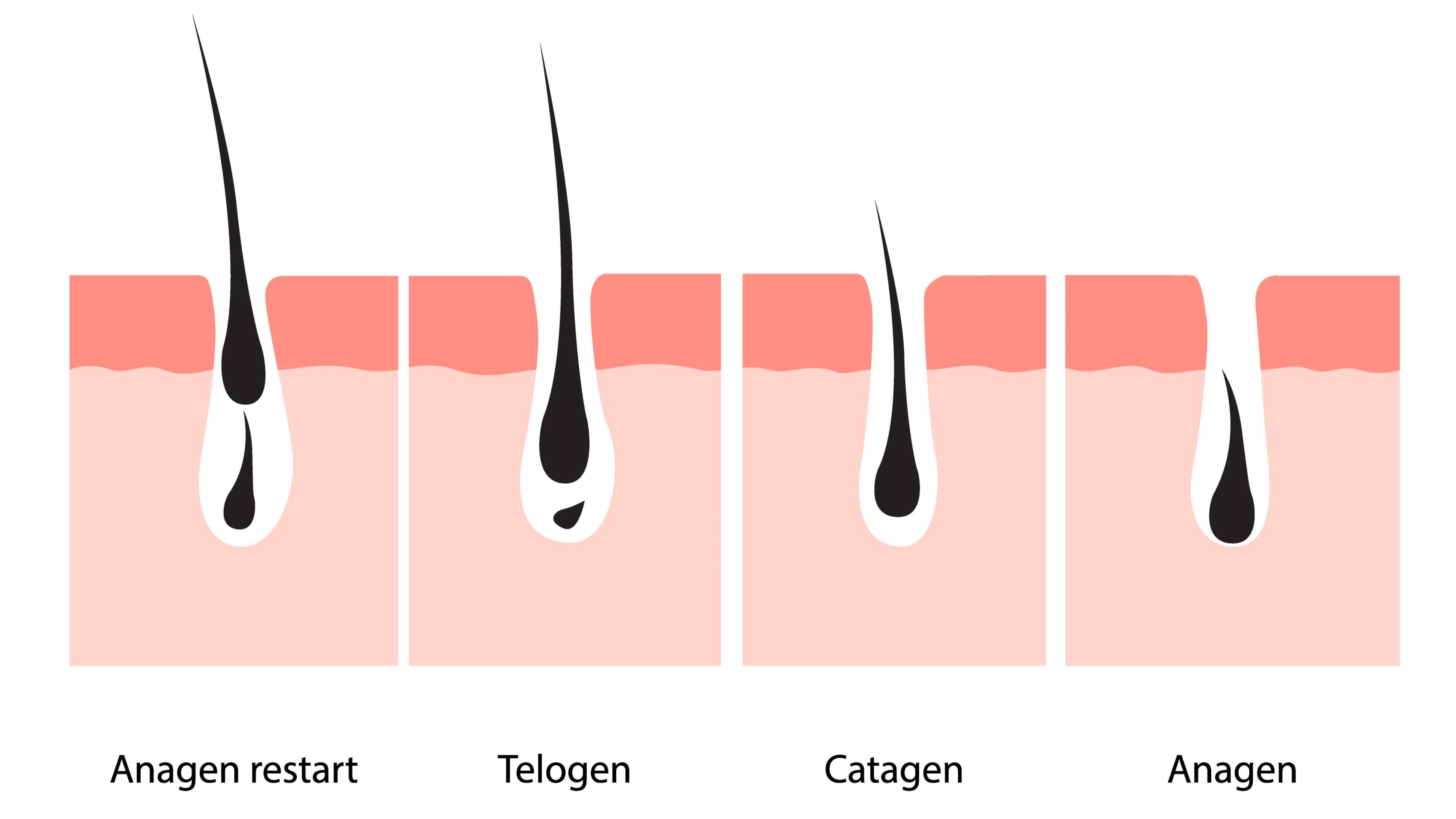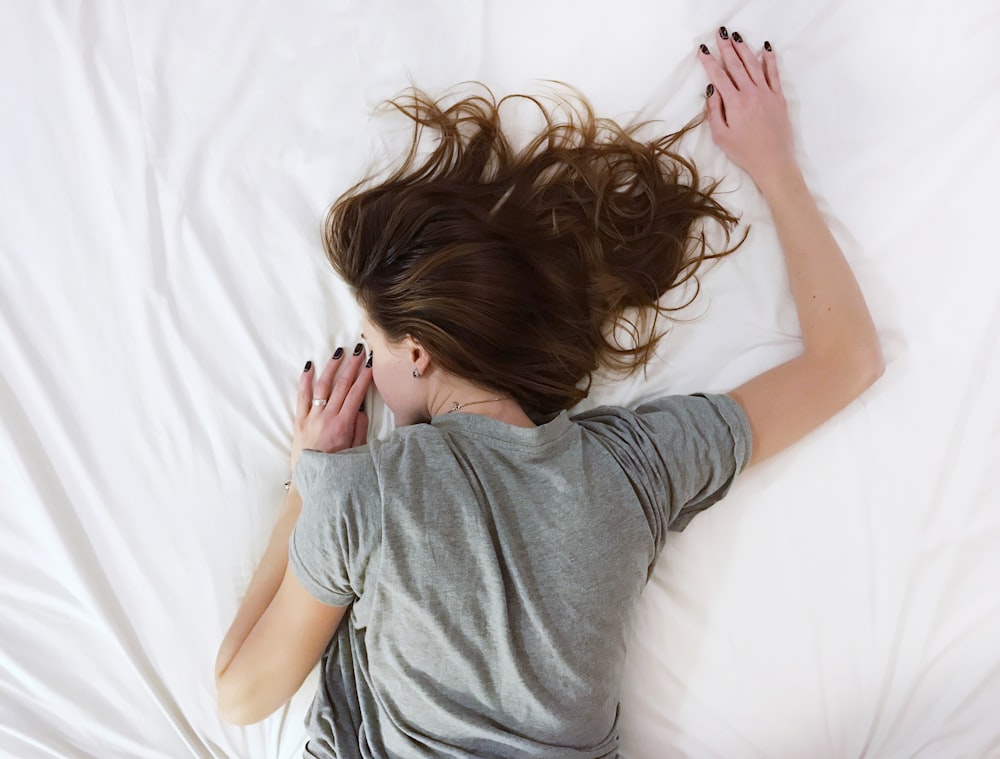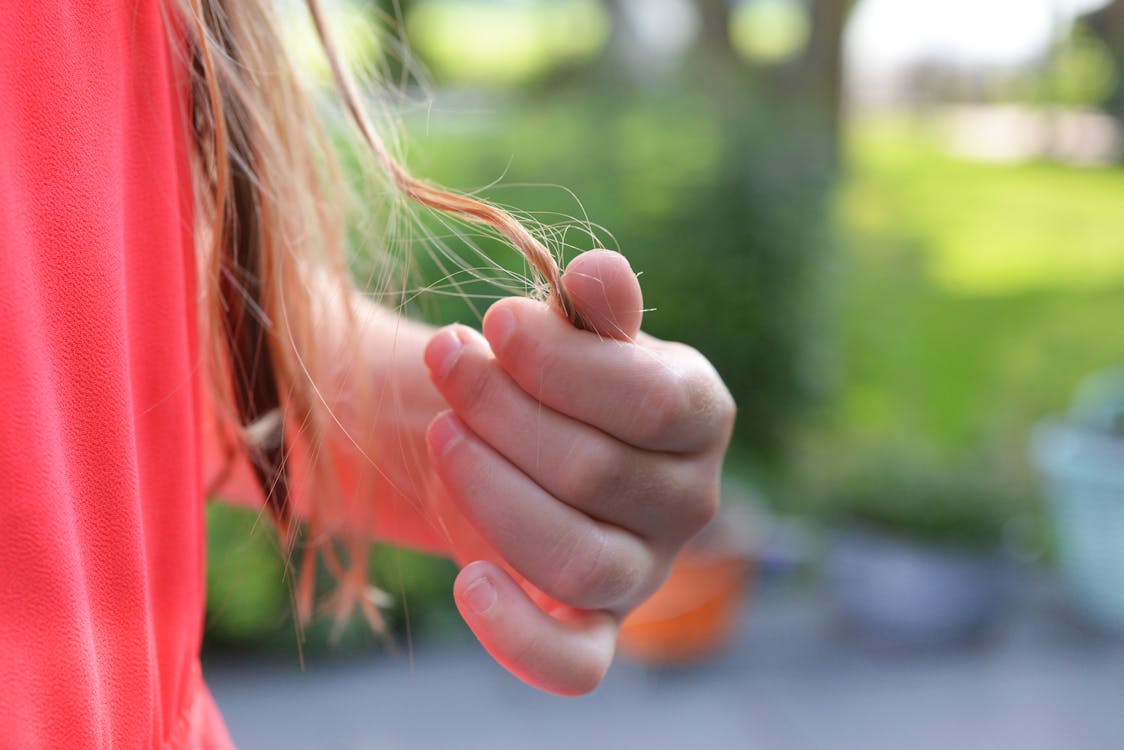While you are taking a shower, it is not always the body wash and the shampoo that's heading into the shower drain. You might also find some hairs clogged into the plughole.
This is normal hair loss and it happens to everyone, regardless of their gender, particularly when shampooing in the shower.
This article will talk about how much hair is normal to lose in the shower, several factors that cause hair loss, and how you can improve your hair health to stop more hairs from falling. Let us begin.
Table of content
How much hair loss is too much?
An average person has around 250,000 hairs on their head, including hair follicles, and it is normal to lose 50 to 100 hairs a day. The average, normal amount of hair shedding for people with long or thick hair is 150 to 200 strands per day.
Your hair's life cycle happens in three phases: anagen phase (active growth phase), catagen phase (normal phase), telogen phase (resting phase) and exogen phase (shedding phase).

This amount can quickly mount up depending on how thick, how long your hair is and how frequently you wash your hair.
This hair loss is normal, and you shouldn't worry too much about the hairs in your drain.
As your leading source for hair health information over the past 4 years, we never compromise on accuracy. When it comes to your health, you deserve information you can truly rely on - and earning your trust is our top priority.
Here's how Scandinavian Biolabs ensures every piece of content meets the highest standards of accuracy and integrity:
- Credentialed Experts: Our reviewers are actively practicing doctors and medical researchers
- Stringent Reviews: Content undergoes rigorous editing by subject specialists and review by a practicing doctor.
- Evidence-Based: We rely on well-established research from trusted scientific sources like peer-reviewed journals and health authorities.
- Full Transparency: Our editorial standards, writer credentials, reviewer credentials, correction process, and funding are all publicly documented.
- Independent Voice: While we do promote products, we operate in a vacuum to business operations. Our main goal is just an unwavering commitment to providing medically-sound guidance.
You can count on Scandinavian Biolabs to consistently deliver the trustworthy health information you deserve. Read our Editorial Standards.
What causes hair loss, generally?
You first need to know what caused your hair loss. If it's one of these, taking fewer showers or using a bristle brush is likely not going to stop thinning hair.
Medical conditions
Health conditions such as thyroid condition, diabetes, etc. can all cause hair loss.
Additionally, hormonal changes such as menopause, hormonal birth control usage or PCOS, DHT is probably causing hair loss.
Read this: DHT Blocker For Women: Will It Stop Your Female Hair Loss?
Medication
Hair loss can occur as a side effect of numerous medicines and over-the-counter drugs, like acne medicines containing vitamin A (retinoids), antifungals, and a few antibiotics.
These drugs cause the hair to enter its resting phase (telogen phase) and eventually shed, thus preventing the cells from dividing further.
Nutrition
Poor nutrition and dietary habits can cause hair thinning, hair falling and breakage. For example, low protein, zinc, iron, vitamin D, selenium, and biotin makes your hair thin, leading to excessive hair fall.
Protein deficiency slows down the formation of new hair follicles because of a lack of essential amino acids.
Another possible cause is vitamin deficiency. The production of new hair follicles requires vitamin D. Additionally, a lack of vitamin A may result in a dry, flaky scalp that lacks moisture to support hair growth. Last but not least, your scalp receives less oxygen when you don’t have enough biotin or vitamin B.
Certain foods are essential to promote hair growth. For example, avocados, red meat, sweet potatoes, sweet peppers, berries, nuts, fish, and eggs are some foods that help in hair growth and strengthen your hair naturally. If deficient, it can cause excessive hair loss.
Stressful event
A stressful event can be anything from giving birth, trauma, or work-related stress - all of them can cause abnormal hair loss. This hair loss is called telogen effluvium - your immune system is at work here to try to balance itself.
The key to stopping telogen effluvium is to reduce stress and fight stress in the first place. Taking up a hobby, practising self-care, and trying yoga can help.
Read this: 9 Effective Methods How To Regain Hair Loss From Stress
Genetics
Your hair loss might occur as a result of your hereditary genes. Androgenetic alopecia (male and female pattern baldness or pattern hair loss) is common in many families, passing permanent hair loss from generation to generation.
If your relatives have hair loss, it's likely that you'll have it too.
What causes hair shedding in the shower?

Aside from the factors stated above, there are several other reasons why your hair sheds in the shower. Let’s review them one by one.
Your hair thickness
Hair loss and shedding vary from person to person. If you have thick hair, you’re likely to shed more hair in the shower than people with thin and short hair.
Furthermore, chemically-treated hair gets thin and brittle with time, which makes them weak, straw-like, and more vulnerable to breakage.
When you last took a shower
Frequent washing and using shampoos, conditioners, and other hair products when showering can contribute to hair falling. This is because using such products daily stimulates your hair and scalp, nudging the hair and causing it to fall out.
If it has been two or three days since you haven’t washed your hair, you will notice more hair coming out.
More on shampoo:
- The 9 Best, Unparalleled Shampoo For Fine Hair To Buy In 2023
- 9 Best & Proven Hair Loss Shampoos For Men In The UK (2023)
When you last really brush your hair
This works similarly to showering. Most of the time, you will experience hair loss when combing and brushing your hair and when you are showering.
Moreover, too much hair brushing also causes breakage, especially when you have thin and weak hair due to bleaching, hair dyes and other chemical procedures. For this reason, it’s mostly advised to use a wide-tooth comb, as bristle brushes or small-tooth combs pull out more hair from the scalp.
Weather
In general, women are more likely than men to suffer from seasonal hair loss, despite the fact that it is still a contentious topic. Several studies conclude that people are more likely to shed hair during summer, as they tend to spend more time under the sun rays, in the pool chlorine, or the sea salts.
These factors cause you to lose your hair strands as they dry out, become brittle, and break easily.
However, extreme winter can also cause the hair to become dry and rough, thus causing hair to fall in the shower.
How to reduce hair shedding in the shower?
Now that you’ve understood why you are losing hair in the shower, it is time to do something about it.
Let us review useful tips to prevent excessive hair shedding and reduce hair loss.
Scandinavian Biolabs Hair Growth Routine

If you notice patches or bald spots on your hair, you need this.
The Hair Growth Routine is specifically formulated to help reduce thinning, grow new strands, and maintain healthy, strong, and vibrant hair.
With no harmful ingredients, this is the shampoo that you can use everyday without fear that it's going to shed your hair.
Use a wide-tooth comb.
The brush type you use on your hair daily can play a significant role in hair loss. In fact, using the wrong brush is one of the major contributors to hair shedding in the shower.
Hence, instead of a small-toothed comb, it is advised to use a wide-tooth comb post-shower when detangling wet hair to prevent further hair breakage and damage. Moreover, brush your hair sparingly and fast. Take your time, and detangle your strands slowly and gently.
Avoid rubber hair elastics.
You can also lose hairs due to how you style your hair and what hair accessories you use. When you let your hair down during showering, the amount of hair you lose might be greater than if you have a habit of tucking your hair into a tight ponytail every day.
It’s possible to lose your hair from wearing overly tight hair accessories. Pullback hairstyles, teasing hairstyles, and brushback hairstyles could also have the same result.
Therefore, it is advised to wear hair ties that go easy on your hairs, such as those made of materials like silk or soft cotton.
Limit heat styling and toxic styling products
The hotter your blow dry, the dryer your hair will become.
Frequent heat tools is going to cause hair breakage, and hair loss.
Hence, no matter how late you are getting for a party or work and how tempting your hair dryer and curler look at that time, it is always wiser to avoid blow drying and let your hair air dry naturally and stop overusage of styling products.
Protect your hair from the sun.

As mentioned earlier, weather can have a significant impact on hair thinning. While most hair growth occurs during hotter months, it’s also true that most hair loss in the shower also occurs during these months.
When you spend too much time under the sun during summer, like swimming in the sea or a pool full of chlorine, tanning on the beach, etc., you always take good care of your skin by applying sunscreen.
But have you thought about your hair? Your hair needs the same protection from the sun as your skin. Sun rays can harm your hair, which can shed hairs.
Hence, to avoid having damaged hair, it is a good idea to use a heat protectant on your hair, wear a hat, or stay in the shade as much as possible.
Read this: How To Repair Damaged Hair Follicles?
A good diet
Taking a balanced diet is an essential consideration for healthy hair. Foods enriched with vitamins, protein, and zinc are important to consume if you want your hair growth cycle to get back into its growth phase.
Hair loss may be associated with vitamin B12 and D deficiencies, biotin, riboflavin, and iron deficiencies. The following foods can be taken to promote hair growth:
- Eggs - an excellent source of protein and biotin
- Berries - rich in antioxidants and vitamin C
- Spinach- rich in iron, folate, and vitamin C and A
- Fish- loaded with omega-3 fatty acids
- Avocados, nuts, seeds, soybeans, beans, red meat, sweet peppers, etc.
Moreover, your hair needs water just like your body does. Dehydration may cause your hair texture to become dry, rough, and brittle, causing shower hair loss.
TL;DR eating a balanced diet should help stop hair loss and grow hair naturally.
When should you worry about ?

Hair loss is completely normal and occurs to everyone at some point in their lives. However, if you notice excessive hairs falling, it may indicate an underlying illness or infection.
In particular, if women go through patchy or excessive hair loss, it could be a cause for concern. Therefore, it’s always better to visit your doctor or trichologist to find out if there’s an underlying cause for your hair falling.
Read more:






